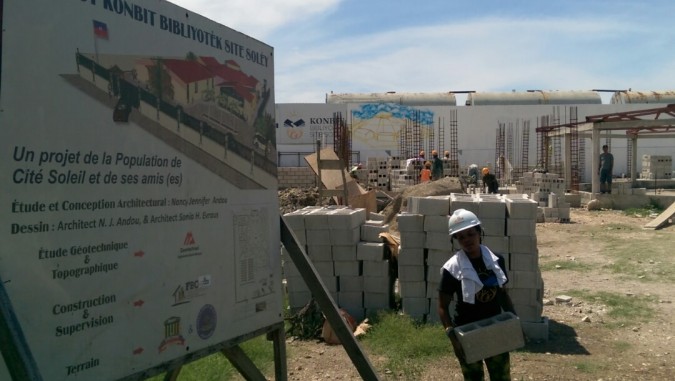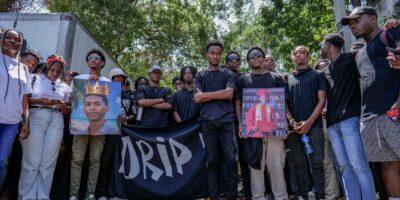The situation requires an urgent response from the government
The country’s cultural centers and libraries, located in areas under the control of armed gangs, are being affected by insecurity. Many are forced to reduce the frequency of their activities while others have stopped functioning altogether.
Such is the case for the Katherine Dunham cultural center, which is located in the Parc national urbain de Martissant (a national park), located in Martissant 23. In June 2021, clashes between rival gangs in Martissant forced officials to stop the center’s activities, according to Thierry Chérizard, project director at Fondation Connaissance et Liberté (FOKAL).
This cultural center opened its doors in 2013. It includes a library and a computer room. The institution is above all a space for meeting, learning, and recreation for the youth of Martissant.
“I used to enjoy watching the children and young people of the neighborhood coming to the center to read, discuss and have fun. Now all of these activities are suspended,” said Cherizard, who has been working on the Parc national urbain de Martissant project since 2010.
The Konbit Bibliyotèk Site Solèy project is almost in the same situation. It was initiated in 2016, by a group of young people who wanted to provide the township of Cité Soleil with a large library. The initiative has been deadlocked for two years by the gang war.
« When we started, there seemed to be peace in the township. But the situation would worsen in 2020. Since then, the advancement of the project has been in jeopardy », regrets Louino Robillard, co-initiator of the project.
The project is expected to cost 50 million gourdes to complete. The staff has already collected over 26 million for its realization. “The construction of the library was 60% complete, explains Robillard, a community development specialist. We had already started with cultural and educational activities. Speakers and writers were sometimes invited.”
The violent clashes between gangs in Cité Soleil that occured on Friday, July 8, 2022, have worsened the situation for the library, which is located not far from the police station of Cité Soleil. The fighting has already left more than 60 people dead.
“No one can get there. Even the police station is abandoned,” says Robillard.
In other less dangerous areas, but still at the mercy of bandits, other cultural centers are trying to hold on. Api pou Rechèch ak Animasyon Kiltirèl Ayisyen (ARAKA), a community based cultural association that runs a cultural center with the same name on Rue de l’enterrement (a road located near the University of Haiti Hospital), is trying to maintain its activities. The number of visitors has decreased significantly.
“Before, we received young people from all over. Now, the presence of young people from Martissant or Bel-Air is rare,” complains Sheenider Jean-Joseph, coordinator of the transitional administrative council of ARAKA.
Given the position of this cultural center, located just a few blocks away from the Portail Léogane and Village de Dieu neighborhoods, those in charge have adopted some strategies to limit the risks.

“Since we can no longer invite writers, such as Yanick Lahens or Franketienne, to give lectures, we are forced to move these activities online,” explains Jean-Joseph. In its 34 years of existence, the ARAKA center has already contributed to the training of several generations of writers. In addition to security problems, the center is experiencing financial difficulties, says Sheenider Jean-Joseph.
But despite their difficult situation, the people in charge of these cultural spaces want to reassure. “We are waiting for peace to return so that we can resume activities at the Katherine Dunham cultural center in Martissant 23,” says Cherizard. In the meantime, to ensure the protection of the documents and materials of the center, the manager says he hires people from the area, who take care of them. Despite the armed clashes blocking the southern entrance to Port-au-Prince, the bandits have not attacked the Parc national urbain de Martissant, which employs more than a dozen people for its maintenance.
Louino Robillard also has no intention of abandoning the investment in the Konbit Bibliyotèk Site Solèy project. “We must invest in the education of Haiti’s children. Children in working-class neighborhoods need recreational spaces, a cultural center, and libraries. Sustainable peace must come through education,” pleads the community development specialist.
The coordinator of the ARAKA transitional administrative council agrees with Robillard. “Youth are extremely vulnerable, » says Sheenider Jean-Joseph. They need the support of the community as ARAKA and the other cultural centers are doing. These initiatives need to be encouraged.”
The most important thing, according to these leaders, is that peace be restored. “I want to call for awareness to the belligerent who prevent the functioning of these spaces. It is necessary to give a chance to the children who really need to visit these facilities,” he says.
The Haitian government has already abandoned the national theater locale located in Bicentenaire, almost opposite the armed gangs 5 segond. The National Library of Haiti (BNH) is also suffering the consequences of insecurity on Rue du Centre. Because of this situation, the authorities of this public institution have decided to reduce the number of operating hours per week.
English translation by Didenique Jocelyn and Sarah Jean.







Comments